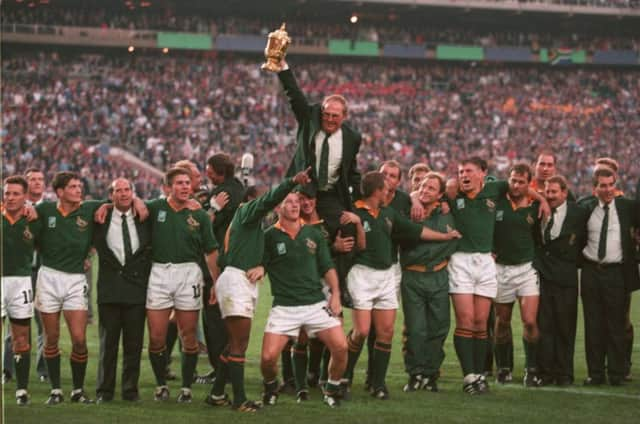Leith Academy pupil who plotted South Africa’s World Cup win


It is now more than 20 years since that victory by the Springboks over the All Blacks at Ellis Park, a sporting moment so iconic it even got the Hollywood treatment. While Francois Pienaar receiving the trophy from President Nelson Mandela is the lasting image, the captain has always talked up the importance of the team’s coach – Kitch Christie.
Born George Moir Christie to a Scottish father and English mother in Johannesburg in 1940, he was sent to his father’s home city of Edinburgh to complete his education and attended Leith Academy in the mid-1950s. It was there that his Scottish friends gave him the nickname he would be known by for the rest of his life – Kitch, in honour of the South African footballer Don Kitchenbrand of Rangers.
Advertisement
Hide AdAdvertisement
Hide AdAfter his time at Leith Academy, Christie attended the London School of Economics for a couple of years before returning to South Africa, where he built up an air conditioning business.
An enthusiastic, if not overly gifted, rugby player with Pretoria Harlequins, Christie gravitated towards coaching. He became an incredibly respected figure in South African rugby but his first taste of the game’s elite level came in 1992 when he was appointed coach of Transvaal. It was there he built one of the country’s greatest ever provincial sides, formed his great partnership with Pienaar, and was the obvious choice to take the reins of the Springboks in 1994 when Ian McIntosh was sacked following a series defeat to New Zealand.
Christie’s tenure, which was cut short by ill health – he battled leukemia from 1979 until his death aged 58 in 1998 – returned a record of played 14 Tests, won 14 Tests and a World Cup.
Edinburgh coach Alan Solomons was assistant to Nick Mallett when their Springboks surpassed that winning sequence with 17 in a row, but this week he reflected on Christie as a “revered figure” in South African sporting folklore.
“I came across him on a few occasions,” said Solomons. “A good friend of mine from university was his assistant for a time at the Harlequins club in Pretoria. He was a thoroughly decent and good man and he took a lot of pride in his Scottish roots. He was tough and prepared to take tough decisions. He was massively loved and respected by all the players but, when he had to be, he was tough.
“I think two examples of that stand out for me. Tiaan Strauss and Francois Pienaar were the two stand-out South African loose forwards of the time but, rather than have two bulls in a pen, Kitch put Strauss out of the World Cup team. A huge decision. He felt that Pienaar was his captain and that would be the most prudent thing to do, and obviously it worked out.
“The other huge call he made was to have two distinct teams in that World Cup squad, they were known as the gold and green teams. So right from inception he was saying this is my top team, the gold team and everyone knew where they stood. It worked out well but obviously it would have been tough for some boys to know right upfront that they were second string.”
Solomons added: “His conditioning regime was first rate too. He didn’t do it himself but he was the boss and gave the instructions. It was a brutal conditioning block prior to the World Cup in 1995 and the team were in magnificent shape.
Advertisement
Hide AdAdvertisement
Hide Ad“I heard one story that after one particularly hard session, he stopped the bus a few kilometres short of the team hotel and made them run back.
“He was tough but fair, respected and well liked and got results wherever he coached. From the Pretoria Harlequins, to the magnificent Transvaal side of the early Nineties, which formed the backbone of the Springboks side that won the World Cup. Winning 14 Tests out of 14 was incredible.”
The last word on Christie should go to his great protege Pienaar, who spoke warmly of the coach in his autobiography, describing their relationship as more like father-son.
“He was the type of strong, disciplined, brave man that I most admired,” wrote Pienaar. “Since 1993 we had grown together. Time and again I felt the benefit of his support and advice. I knew he supported me, I knew he cared for me. He never let me down. This had been the character of our relationship. I would listen to his advice, I would implement his gameplan.”
Christie’s last match in charge came in a November 1995 win over England at Twickenham. By that time his health was deteriorating again and Pienaar recalled Christie joining the pre-match huddle: “The usual end to such a Springboks huddle is for the players to squeeze each other and shout ‘Bokke’. James and I squeezed the coach and discovered later we’d fractured two of his ribs. He never said a word.”